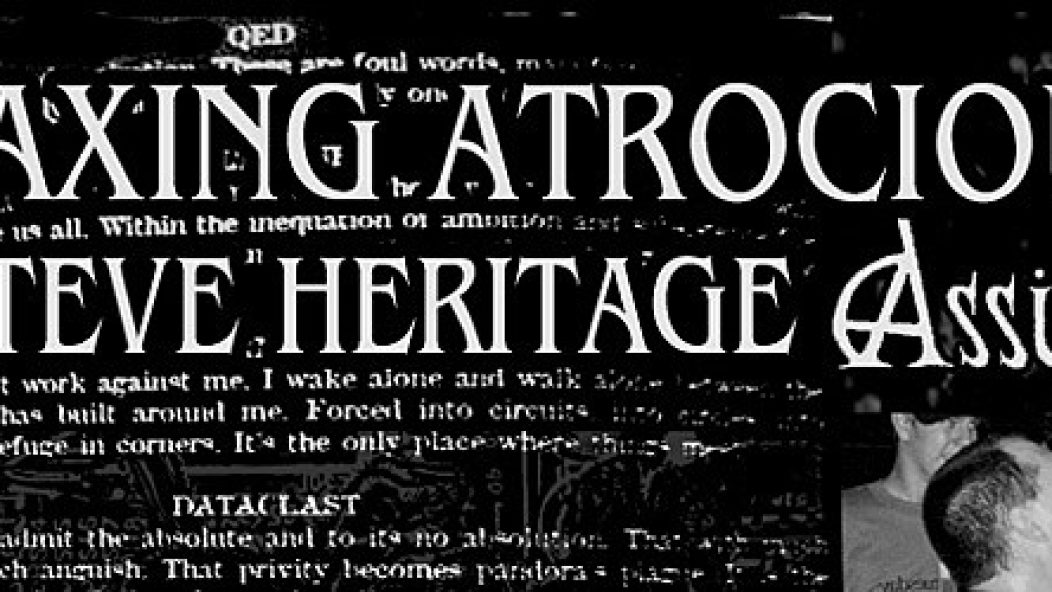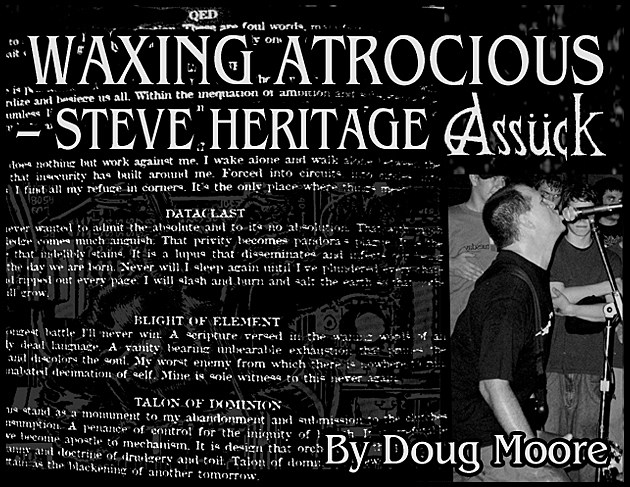
Waxing Atrocious - Assück's Steve Heritage
. . .
When I was 14 years old, my older sister came across the Anti-Flag record Mobilize. Its second track, “Mumia’s Song”, is a characteristically chirpy anti-authoritarian screed—its refrain is “Free all political prisoners! / Racist cops plus racist judges don’t equal justice! / Free all political prisoners!”:
The song became the target of extended mockery from my sister, who would shout the refrain in response to banal acts of parental oppression:
Mom: “You have to go to bed.”
Sister: “RACIST COPS PLUS RACIST JUDGES DON’T EQUAL JUSTICE!”
Me: (hysterical laughter)
. . .
This experience stuck with me. It gave me a distaste for didactic politics in punk and metal that I retain to this day. I’m not indifferent to politics; I follow them closely. And there’s political music that I love, though it’s usually in spite of the lyrics rather than because of them. (The Clash comes to mind.)
It wasn’t even that my sister—and, by extension, I—disagreed with the message in “Mumia’s Song”, per se. It was that message’s choir-preaching simplicity, its sloganeering, that drew her ire. For a band that presents themselves as a free-thinking nonconformist institution, Anti-Flag leaves little room for doubt or ambiguity in their lyrics.
They are not the only band to encounter this difficulty. Political lyrics are a tough proposition. The subject matter is generally too complicated to talk about productively within the limited space of a piece of popular music, and most musicians who write explicitly political lyrics don’t know as much about the subject as they think they do. Nothing kills a song faster than a dopey rallying cry in place of a chorus. As far as metal in particular goes, incomprehensible screams are a bad medium for complex ideas. (I say this as someone who has some experience with trying to convey complex ideas by screaming them at people.)
But there are exceptions to my distaste for political lyrics. Though lyrics are a poor medium for complex reasoning, they are an excellent medium for complex emotions. The most effective political lyricists write about the way politics feel, rather than what they think about politics. Dealing with the realities of modern life is often a murky, uncertain affair, and impressionistic lyrics can be a great way to communicate its difficulties. Chris Colohan’s work with Cursed is one example of the approach I’m thinking of. JR Hayes’s lyrics for Pig Destroyer prior to the nasty breakup that shaped Prowler in the Yard are another.
. . .
The common ancestor to both is guitarist/vocalist Steve Heritage of the ’90s deathgrind act Assück. Assück were an influential band in their own right; the idea of “deathgrind” as a discrete genre arose partially from their work, especially on 1997’s seminal Misery Index LP. But when I think of Assück, I don’t think of stern riffs or Rob Proctor’s excellent blasts—I think of Heritage’s explosive, poetic wordplay. (Ironically, the band Misery Index—who take their name from the Assück album—trade mostly in Anti-Flag-esque slogans, though lyricist Jason Netherton has produced outstanding work at times.)
Misery Index’s cover depicts a naked man, contorted in chains, superimposed on a circuit board. The image struck me instantly when I first saw it as a teenager—the chained figure offered a visually arresting image of suffering, and while the computer juxtaposition implied a critique, it did not spell anything out. Its reticence was alluring. When I bought the album, I flipped to the lyrics even before I put the CD into the player. (I wish album art could still elicit that reaction from me.)
Like the vast majority of politically engaged musicians from the punk/metal underground, Steve Heritage comes from the anticapitalist-left thought tradition. It’s telling that I love his lyrics as much as I do despite my general lack of enthusiasm for his positions. There is no simplistic ideological bludgeoning in Heritage’s work. His lyrics are as much self-portrait as instructive tool.
. . .
The formal restrictions of grind-length songs would suffocate some lyricists. For Heritage, they were liberating. His lyrics depended heavily on compressed bursts of searing prose poetry; he would often nail an excruciating emotion down with just a sentence or two.
Some examples from Misery Index, which runs just 15 minutes, follow. The frenetic words and the frenetic sounds pair up beautifully. (You can read the complete lyrics here.)
From “Salt Mine”:
”There is prostitution in everything wrought under the sun . . . Insomniac servitude to an infinity of misery.”
From “Corners”:
“Time does nothing but work against me. I wake alone and walk alone between the walls that insecurity has built around me. Forced into circuits, into circles, into cycles. I find all my refuge in corners. It’s the only place where things meet.”
From “Sum and Substance”:
”And if at any time it should fall, I will raise and carry the banner of hopelessness and lead its war.”
From “Reversing Denial”:
”I can no longer deny or disavow that there is a part of me that is a part of it. A process regenerated by process reciprocating godhead apparatus that never ends. A grip that wrenches and discards threadbare. A piece of that which I abhor.”
From “Lithographs”:
”Of the many things worthy of dying, there are none worthy of killing . . . Here, every life given is adorned with the guilt of a life stolen from another child that cries for a loved one they never knew.”
From “Intravenous”:
”There is numbness in speaking meaningless idioms to a faceless mass. I know the gridlock and the stalemates. I know insignificance all too well.”
. . .
Notice the lack of explicit policy prescriptions in these lyrics, or even of a sense of receptive audience—it’s all “I”, not “we”. No light shines upon these pages. Heritage “wakes alone and walks alone”; he “carries the banner of hopelessness”; he “is a piece of that which [he] abhors”; he “knows insignifcance all too well”.
This sense of failure and isolation is what makes Assück’s lyrics so compelling, and so innately metal despite their punk politics. There’s no chirpy sloganeering here; slogans can get crowds going, but these clipped pronouncements would make better eulogies than calls to arms. When I read them now, they seem prescient—in ’97, when Misery Index came out, our modern world of drone strikes, stagnating wages and digital surveillance was in its birth throes. The modern lens yields an even darker interpretation:
Heritage is not drumming up support for his position on this album, but memorializing its collapse. The war is already over, though we never noticed its beginning. We lost. All that is left to read are the fragmentary memories of a lonely soldier who died in the mud of day-to-day experience, defending a lost cause in vain.
. . .











